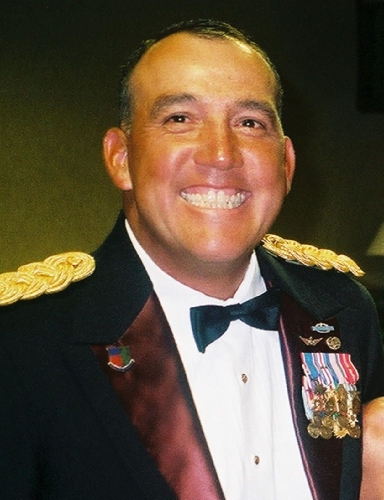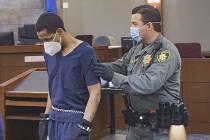Fake ID use upsets military veterans
When he lived in Las Vegas, Jacob R. Cruze used fake military documents to obtain license plates reserved for wounded Nevada war veterans.
After he moved to Virginia last year, he used a fake military identification to get license plates from the Department of Motor Vehicles that showed he was a Special Forces soldier, police say.
In both cases, he was caught for displaying license plates that he obtained illegally. But in Virginia he faces stiffer penalties from his Feb. 2 arrest for what amounts to felony military fraud, although it isn't spelled out as such in Virginia's code.
The charge in Virginia pertaining to a fictitious military ID, in Cruze's case, carries a fine of up to $100,000 and/or two to 10 years in prison. That's a lot more than the $399 in traffic ticket fines he paid in Las Vegas for illegally driving with Purple Heart plates.
Cruze's most recent arrest has angered veterans in Southern Nevada who say his actions, though not defined specifically as military fraud, should be prosecuted uniformly at both state and federal levels.
"This is why we need a state Stolen Valor Act that focuses on fraud," said Bill Anton, past president of Special Forces Association Chapter 51.
Anton said Cruze's false claims of being a highly decorated retired Army colonel were done to gain prestige or anything of value, regardless of arguments the U.S. Supreme Court is currently weighing in light of the federal Stolen Valor Act and free speech.
"I want to see the Supreme Court uphold our Stolen Valor Act and Nevada to implement one," he said Friday.
Anton, of North Las Vegas, helped craft a Stolen Valor bill for Nevada last year, but he said Assemblyman William Horne, D-Las Vegas, changed the bill's criteria for violations and diluted its enforcement power. The bill died in conference committee without a final vote.
Another veteran, Pete Wallace, a retired Navy heavy equipment operator first class from Pahrump, wrote the police department in Leesburg, Va., after Cruze was arrested.
Wallace wrote that he was "so sick and tired of these weirdos claiming to be military heroes" that he urged police officials "to light a fire under the asses of the U.S. attorneys office for the Eastern District of Virginia" to prosecute Cruze under the federal Stolen Valor Act.
When asked if federal prosecution was being considered, a spokesman for the Eastern District of Virginia said as a matter of policy "we do not discuss whether an individual is or is not going to be charged with a federal crime."
The spokesman, Peter Carr, said a review of files shows no one in the district has been prosecuted under the Stolen Valor Act that Congress passed in 2006.
A Las Vegas police detective who was part of an FBI task force confiscated Cruze's Nevada Purple Heart license tags in 2005. Likewise, on Feb. 2, a detective in Leesburg, Va., confiscated his phony military ID and Special Forces plates.
Now Cruze, 55, sits in a jail at the Loudoun County Detention Center in Virginia awaiting his next court appearance on at least two felony fraud charges after a preliminary hearing Tuesday.
Lawyers and sources close to the case say the matter could be resolved through an agreement to not prosecute him on another felony fraud charge -- forgery -- and a misdemeanor for lying about being a doctor at a weight-loss clinic. The deal hinges on Cruze pleading guilty to falsifying his DMV application and "uttering" a fake military ID.
The DMV in Virginia requires that person who requests specialty plates must provide proper credentials or documents.
Detective Matthew Hackney said when Cruze showed the DMV the fake military ID, Cruze represented it as a true document, therefore violating the code for uttering that it was a true document.
Court records show Cruze waived his preliminary hearing Tuesday. Sources said he waived the hearing for not prosecuting the felony forgery charge and the misdemeanor charge because he intends to plead guilty to the other two fraud charges.
Robert Bruce, the public defender who represents Cruze, said he couldn't discuss details of the plea arrangement; nor would the prosecutor, Assistant Commonwealth Attorney Angela Vernail.
What pleas Cruze will enter remain to be seen.
Vernail noted that Cruze could back out of the deal before entering his plea when he is expected to appear before a Virginia judge in about two months.
Vernail said nothing in the law would prohibit Cruze from being prosecuted on the felony fraud charges in addition to the federal Stolen Valor Act.
While Virginia has no state Stolen Valor Act, she said the federal Stolen Valor Act "is on my radar screen," although it would be up to the U.S. attorney to decide on pursuing any charges.
In 2004 in Las Vegas, Cruze raised suspicions of Anton and other former Army Rangers when he showed up at the Riviera for their annual conference wearing a dress-blue uniform bearing a colonel insignia and numerous ribbons and medals on his jacket. But when he was asked about his military career by attendees, his comments didn't fit with events, locations and dates of military operations.
A month before the conference, Cruze had spoken to fifth-graders gathered for a career day event at Eisenberg Elementary School, where he wore a green Class A Army uniform and a display of ribbons. A source familiar with his career day presentation said he gave the students a "drill sergeant" routine and later remarked that he hoped he hadn't been too hard on the students.
Cruze had posted a résumé with a nursing organization that said he served in Vietnam from June 1969 to September 1970 as a combat medic and had earned the Distinguished Service Cross, Silver Star, Bronze Star, Purple Heart, Cross of Gallantry, Soldiers Medal and the Army Distinguished Service Medal.
The POW Network, a nonprofit watchdog organization, obtained records from the National Personnel Records Center in St. Louis under a Freedom of Information Act that showed Cruze never served in combat and received no awards or decorations. Instead, he is listed as an Army reservist from July 21, 1988, to Jan. 3, 1994, who served on inactive status for a hospital unit in Phoenix.
Daniel Bogden, the U.S. attorney for Nevada, was asked in 2006 why Cruze wasn't charged with violations of the Stolen Valor Act. Bogden responded to an email from the Review-Journal then, saying, "Considering our limited resources and manning we did not feel that additional misdemeanor charges ... were necessary since the matter had already been addressed by local authorities."
Contact reporter Keith Rogers at
krogers@reviewjournal.com or 702-383-0308.




























